unit10主将从现句
新人教版八年级上_unit10_If_you_go_to_the_party__you’ll___have_a_good_time_Section_B
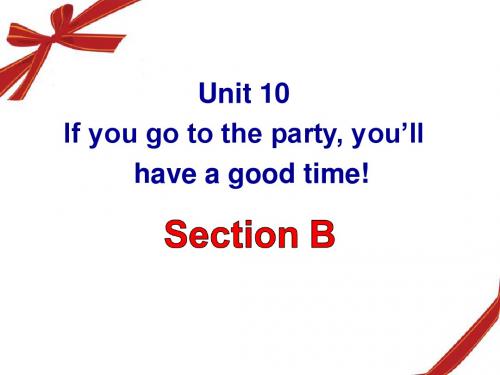
careless做形容词,意为“粗心 的”“不小心的”, 在句中可用作定语或表语。 如:It was careless of you to leave the door unlocked. 你没锁门,太粗心了。 The careless waiter dropped the dish onto the ground. 那个粗心的侍者把盘子摔到了地上。
Language points
1. If people have problems ,they should try to keep them to themselves. keep....to oneself意为“保守秘密”, 如:One must keep such interests to oneself. 有这类爱好不该让人知道。 We should keep their worries to themselves。 我们应该为他们的忧虑保守秘密。 keep....to oneself还可意为“不与人来往;不交际”, 如:Keep sb at arm's length not allow oneself to become too friendly with sb. 与某人保持距离;不使自己太亲近某人。
Students these days often have a lot of worries. Sometimes they have problems with their schoolwork, and sometimes with their friends. What can they do about this? Some people believe the worst thing is to do nothing. Laura Mills, a teenager from London, agrees. ”Problems and worries are normal in life,” says Laura. “But I think talking to someone helps a lot. Unless we talk to someone, we’ll certainly feel worse.”
初二英语U10 知识点整理

If you fail in the exam, you will let him down.
如果下雨,我们就不去野炊了 If it rains tomorrow, we won’t go on a picnic.
(2)have a good time
have a good time doing=have fun doing=enjoy oneself doing
8.你只要跟人聊聊这个问题,你的问题就解决了一半。
So you’re halfway to solving a problem just by talking to someone about it! be halfway to… 表示“完成了或者做了事情的一部分”,其中to为介 词 如 :我们才仅仅完成了工作的一部分。 we’re still only halfway to finishing the job.
句中的by在这里表示方式,“通过(…办法);使用(…)方式”的意思。
通过做某事
by doing sth.
by sb.'s advice/on sb.'s advice 依某人劝告 follow sb.'s advice 接受某人意见 give advice 劝告, 忠告
Section B
6. If people have problems ,they should try to keep them to themselves. keep....to oneself意为“保守秘密”, 如:We should keep their worries to themselves。 我们应该为他们的忧虑保守秘密。 keep....to oneself还可意为“不与人来往;不交际”
Unit10 知识要点解析
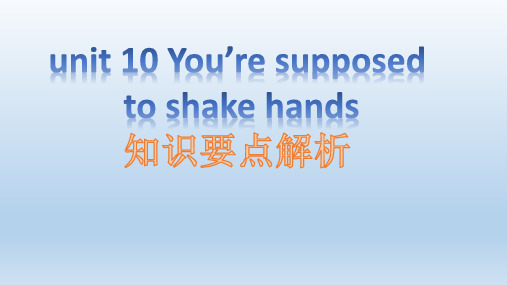
• be worth doing sth 值得做某事,句子主语一般事或物,是do的宾语 • be worth +钱 “值多少钱” • be worth +名词 “值得” • well worth ‘很值得’,不能说 very worth • 【练一练】
_________(握手)with them. • ②当第一次见朋友是,你们应该握手。 • You’re ________ to shake ______ (hand) when you meet your
friends.
3.In the United States, they’re expected to shake hands. 在美国,他们应该握手。
11.If there are people in the meeting room , you are supposed to knock before entering .
• knock v. 敲(门等), 碰撞 • knock at/on the door 敲门 knock into 与......相撞 knock down 撞倒 • 【练一练】用介词at/on,into,down填空 • 1)He knocked ______ the door , but no one answered. • 2)The car knocked ________ the tree last night and the driver hurt. • 3)The boy was knocked ________ by a running bike on the street.
tired.
Unit 10 知识点精讲精练

Unit10 If you go to the party you’ll have a great time!知识点讲解一、If you do, the teachers won’t let you in.do, does, did等助动词可用来代替上文提到的动词,以避免重复例句:I don’t want to go shopping, but she does. 我不想去购物,但是她想去。
二、If you ask people to bring food, they’ll just bring potato clips and chocolate because they’ll be too lazy to cook. 如果你让大家带食物来,他们只会带炸薯条和巧克力,因为他们太懒了。
1、ask sb. to do sth.意为"要求某人做某事",其否定形式是"ask sb. not to do sth."要求某人不要做某事。
例句:I ask him to go to the movies. 我让他去电影院。
(2)too + adj./adv. + to do sth. 意为"太……而不能做某事",表否定意义。
【注意】too … to … 有时可与not ... enough to...进行同义转换。
例句:The math problem is too difficult for me to work out. 这道数学题太难,我解不出来。
例句:The boy is too young to join the army. = The boy is not old enough to join the army.这个男孩太小了还不能参军。
三、If you go to the party, you’ll have a great time. 如果你参加聚会,你将会玩得很开心。
1、本句是含有条件状语从句的复合句。
人教版英语八年级unit10知识点全解
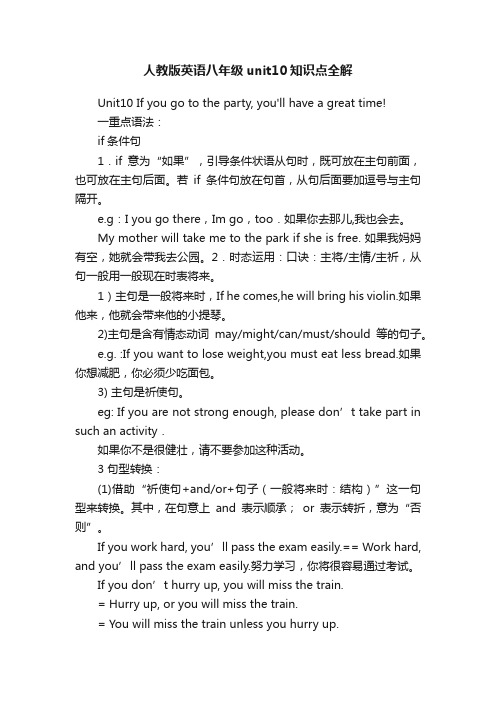
人教版英语八年级unit10知识点全解Unit10 If you go to the party, you'll have a great time!一重点语法:if条件句1.if意为“如果”,引导条件状语从句时,既可放在主句前面,也可放在主句后面。
若if条件句放在句首,从句后面要加逗号与主句隔开。
e.g:I you go there,Im go,too.如果你去那儿,我也会去。
My mother will take me to the park if she is free. 如果我妈妈有空,她就会带我去公园。
2.时态运用:口诀:主将/主情/主祈,从句一般用一般现在时表将来。
1)主句是一般将来时,If he comes,he will bring his violin.如果他来,他就会带来他的小提琴。
2)主句是含有情态动词may/might/can/must/should等的句子。
e.g. :If you want to lose weight,you must eat less bread.如果你想减肥,你必须少吃面包。
3) 主句是祈使句。
eg: If you are not strong enough, please don’t take part in such an activity.如果你不是很健壮,请不要参加这种活动。
3 句型转换:(1)借助“祈使句+and/or+句子(一般将来时:结构)”这一句型来转换。
其中,在句意上and表示顺承;or表示转折,意为“否则”。
If you work hard, you’ll pass the exam easily.== Work hard, and you’ll pass the exam easily.努力学习,你将很容易通过考试。
If you don’t hurry up, you will miss the train.= Hurry up, or you will miss the train.= You will miss the train unless you hurry up.如果你不快点,你会错过火车。
八年级上册英语unit10条件状语从句讲解
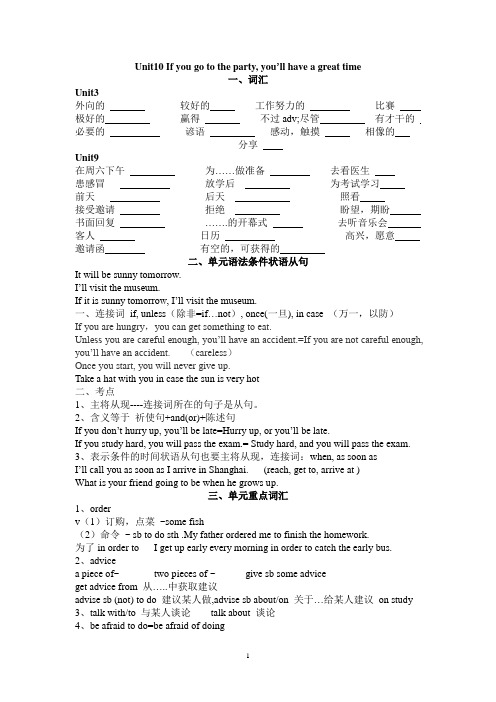
Unit10 If you go to the party, you’ll have a great time一、词汇Unit3外向的较好的工作努力的比赛极好的赢得不过adv;尽管有才干的必要的谚语感动,触摸相像的分享Unit9在周六下午为……做准备去看医生患感冒放学后为考试学习前天后天照看接受邀请拒绝盼望,期盼书面回复…….的开幕式去听音乐会客人日历高兴,愿意邀请函有空的,可获得的二、单元语法条件状语从句It will be sunny tomorrow.I’ll visit the museum.If it is sunny tomorrow, I’ll visit the museum.一、连接词if, unless(除非=if…not), once(一旦), in case (万一,以防)If you are hungry,you can get something to eat.Unless you are careful enough, you’ll have an accident.=If you are not careful enough, you’ll have an accident.(careless)Once you start, you will never give up.Take a hat with you in case the sun is very hot二、考点1、主将从现----连接词所在的句子是从句。
2、含义等于祈使句+and(or)+陈述句If you don’t hurry up, you’ll be late=Hurry up, or you’ll be late.If you study hard, you will pass the exam.= Study hard, and you will pass the exam. 3、表示条件的时间状语从句也要主将从现,连接词:when, as soon asI’ll call you as soon as I arrive in Shanghai. (reach, get to, arrive at )What is your friend going to be when he grows up.三、单元重点词汇1、orderv(1)订购,点菜~some fish(2)命令~ sb to do sth .My father ordered me to finish the homework.为了in order to I get up early every morning in order to catch the early bus.2、advicea piece of~ two pieces of ~ give sb some adviceget advice from 从…..中获取建议advise sb (not) to do 建议某人做,advise sb about/on 关于…给某人建议on study3、talk with/to 与某人谈论talk about 谈论4、be afraid to do=be afraid of doingI’m afraid to speak in class= I’m afraid of speaking in class条件状语从句练习1.(2010潍坊中考)You have to leave now________you can catch the early bus..A.so that B.as soon as C.because D.if2. (2010上海中考)We will have no water to drink _______we don’t protect the earth.A.untilB.beforeC.thoughD.if3.(2010·铜仁中考)— May I go to the concert with you?—I’m afraid not ____ you have a ticket, because I have only one.A. sinceB. ifC. unlessD. though4.(2011哈尔滨)As we all know, planting trees is good for the environment. Our class will go to the Sun Island tomorrow. As soon as we there, we’ll begin to plant tree s.A. arrivedB. arriveC. will arrive5.(2011广东)—Let’s go fishing if it _____ this weekend.—But nobody knows if it _______.A. is fine, will rainB. will be fine, rainsC. will be fine, will rainD. is fine; rains6.(2011黑龙江齐齐哈尔)I’m waiting for my friend. , I’ll go shopping a lone.A. If she comesB. If she doesn’t comeC. If she won’t come7.(2011重庆江津)If she here tomorrow, I will tell you.A. comesB. will comeC. comeD. came8.(2011山东滨州)—Mary, could you tell me if your mother ________ our school sports meeting tomorrow?—I th ink she will come to school if she _________ free.A. will take part in; will beB. takes part in; isC. will take part in; isD. takes part in; will be9.(2011山东泰安)—Tom wants to know if you will have a picnic tomorrow.—Yes. But if it ______, we’ll play chess instead.A. will rainB. rainedC. is rainingD. rains10.(2011山东潍坊)If Tom _____ the game, we'll give him a surprise".A. winB. winsC. wonD. miming11.(2011浙江宁波)— I hear the famous singer Xu Song may come to Ningbo next month.— Really? _______ he comes, my younger sister will be very excited.A. IfB. UntilC. UnlessD. Before12.(2011雅安)The students ________ have a sports meeting this weekend if it ________.A. won’t; rainsB. will; rainsC. won’t; will rainD. are going to; is going to rain13.(2011湖南湘西)Don’t talk loudly a t the meeting. If you ________, you will have to leave.A. doB. areC. did14.(2011湖南益阳)I don't know if she to my birthday party tomorrow. If she , I'll be very happy.A. comes; comesB. will come; comesC. comes; will come15.( 2011大庆) — When will you come to Daqing?— I will call you _____I arrive.A. tillB. whileC. as quickly asD. as soon as16.(2011广西崇左)I’ll give it to Jim as soon as I ____him tomorrow.Asaw B.will see C.see D.have seen17.(2011北京)I will send you an e-mail as soon as I____ in Canada.A. arriveB. arrivedC. am arrivingD. will arrive18.(2011陕西)If there no buying and selling of animals, there no killing in nature.A. is; will heB. will be; will beC. is; isD. will be; is19.(2011黑龙江绥化市)I’m waiting for my friend. _, I'll go shopping alone.A. If she comesB. If she won't comeC. If she doesn't come20.(2011内蒙古包头)You can’t watch TV ________ you finish your homework.A. beforeB. ifC. whileD. as21.(2012.安徽省)-- What's your plan for the summer holidays?--I’ll go to Beijing_____ the school term ends.A. in order thatB. so thatC. as soon asD. even though22.(2012福建福州)— We'll go for a picnic if it____________this Sunday.— Wish you a lovely weekend.A. rainB. doesn't rainC. won't rain23.(2012年广东省)— If our government _____attention to controling(控制) food safety now, our health _____in danger.A.won’t pay, isB. doesn’t pay, isC. won’t pay, will beD. doesn’t pay, will be24.(2012湖北黄冈)—Excuse me. Could you wake me up when my friend____ here?—Of course. [:hat we still don't know when your friend _____ here.A. comes; will comeB. comes;comesC. will come; comesD. will come;will come25.(2012四川成都)—I want to know when Mr. Brown will arrive.—When he , I will tell you.A. will arriveB. arrivedC. arrives26.(2012四川雅安市)If a polar bear_____, it _____fish from the water.A. will be hungry; catchesB. is hungry; will catchC. is going to be hungry; catchesD. is hungry; won’t catch27.(2012浙江衢州)We Will go for a picnic if it_______tomorrow.A. doesn't rainB. wasn't rainyC. won't rainD. wasn't raining28.(2012贵州六盘水)-Do you know if we will go for a picnic this Saturday?-I think we will if we any classes.A. won ' t haveB. didn’t' t haveC. don't haveD. aren ' t having29.(2012贵州铜仁)The bus driver always says to us ,―Don’t get off________ the bus stops.‖A. whenB. while C .until D. if30.(2012山东·东营市)– Excuse me, can I interview Mr. Miller this afternoon?-- A moment, please. Let me check .A. i f Mr. Miller will be freeB. when will Mr. Miller have timeC. if Mr. Miller had an appointmentD. when does Mr. Miller come back31.When I ____home yesterday evening, my father _____TV。
初中英语人教版八年级上册《Unit10 If you come to my party,you'll

• My parents always give me some good advice when I am in trouble.
当我遇到困难时,父母总会给我一些好的建议。
• I think you'd better follow your friend's advice. 我认为你最好听从你朋友的建议。
2. 基本句式
肯定句:sb. should +动词原形. • Maybe you should say sorry. 也许你应当说对不起。
否定句:sb. shouldn't +动词原形. • You shouldn't eat in the classroom.
你不应当在教室里吃东西。
一样疑问句:should sb.+动词原形? • Should she come here this afternoon? 下午她应当来这里吗?
1. If I get up late tomorrow, I’ll be late for class
2. If I don't finish my homework, the teacher will be angry with me.
3. If I don't get enough exercise, I’ll not be very healthy.
3a Fill in the blanks with the correct forms of the verbs in brackets.
Dear Su Mei, I don’t _k_n__o_w_ (know) what to __d_o___ (do) about going to Mike’s birthday party tomorrow night. My parents _th_i_n_k_ (think) I should study for my English exam next week. If I __g_o__ (go) to the party, they _w_i_ll_b__e_ (be) upset.
八年级英语Unit 10 语法点If 引导的条件状语从句
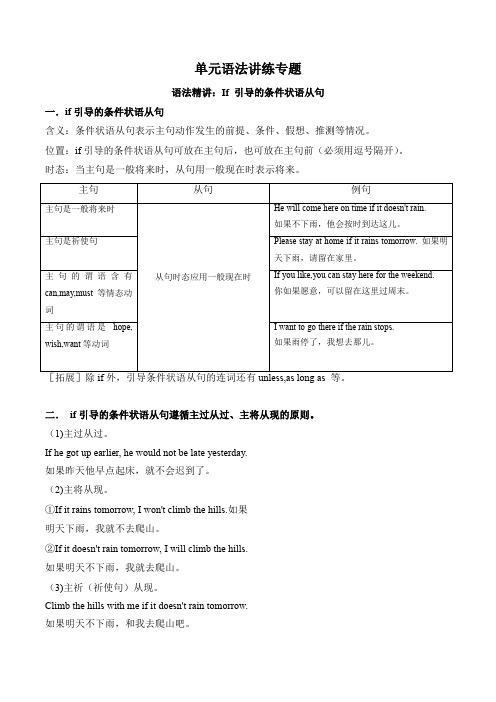
单元语法讲练专题语法精讲:If 引导的条件状语从句一.if引导的条件状语从句含义:条件状语从句表示主句动作发生的前提、条件、假想、推测等情况。
位置:if引导的条件状语从句可放在主句后,也可放在主句前(必须用逗号隔开)。
时态:当主句是一般将来时,从句用一般现在时表示将来。
主句从句例句主句是一般将来时从句时态应用一般现在时He will come here on time if it doesn't rain.如果不下雨,他会按时到达这儿。
主句是祈使句Please stay at home if it rains tomorrow. 如果明天下雨,请留在家里。
主句的谓语含有can,may,must等情态动词If you like,you can stay here for the weekend.你如果愿意,可以留在这里过周末。
主句的谓语是hope, wish,want等动词I want to go there if the rain stops.如果雨停了,我想去那儿。
二.if引导的条件状语从句遵循主过从过、主将从现的原则。
(1)主过从过。
If he got up earlier, he would not be late yesterday.如果昨天他早点起床,就不会迟到了。
(2)主将从现。
①If it rains tomorrow, I won't climb the hills.如果明天下雨,我就不去爬山。
②If it doesn't rain tomorrow, I will climb the hills.如果明天不下雨,我就去爬山。
(3)主祈(祈使句)从现。
Climb the hills with me if it doesn't rain tomorrow.如果明天不下雨,和我去爬山吧。
(4)主情(情态动词)从现。
If it doesn't rain tomorrow, I might climb the hills.如果明天不下雨,我可能会去爬山。
人教版八年级上册英语Unit 10 知识点语法归纳总结
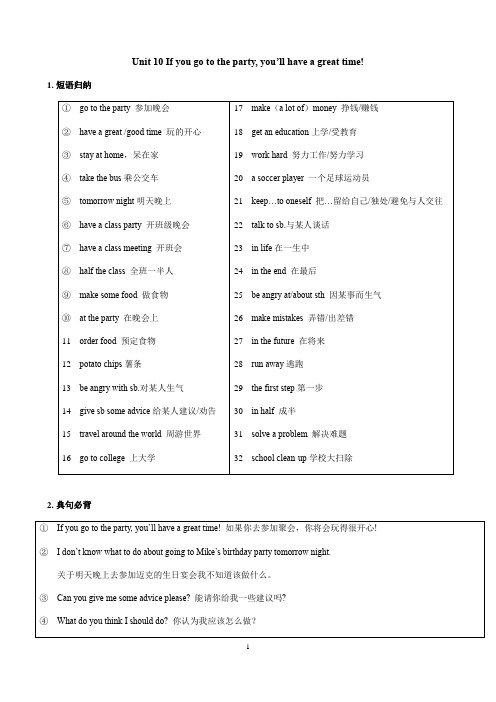
Unit 10 If you go to the party, you’ll have a great time!1.短语归纳2.典句必背3.用法集萃(1)If you go to the party, you’ll have a great time! 如果你去参加聚会,你将会玩得很开心!❖if是连词,意思是“假如;如果”,引导条件状语从句。
if引导的条件状语从句中常用一般现在时表示将来,而主句用一般将来时,即遵循“主将从现”的原则。
例:If you’re free, we’ll go shopping next Sunday. 如果你有空,我们下星期天要去购物。
❖if用作连词,还可意为“是否”,可以引导宾语从句,其同义词为whether。
例:I don’t know if Tom will come here tomorrow. 我不知道汤姆明天是否会来这里。
(2)I don’t know what to do about going to Mike’s birthday party tomorrow night.关于明天晚上去参加迈克的生日宴会我不知道该做什么。
❖what to do“做什么”,为“疑问词+动词不定式”结构。
疑问词what, which, when, where, how等,常用于know, tell, wonder,ask, find out,learn等动词或动词短语之后作宾语,构成“疑问词+动词不定式”结构。
(3)Can you give me some advice please? 能请你给我一些建议吗?❖advice为名词,其用法如下:(4)travel around the world 环游世界❖辨析:tour, trip, journey, travel(5)What do you think I should do? 你认为我应该怎么做?❖辨析:shall, should(6) Unlesswe talk to someone, we’ll certainly feel worse.除非我们和某人交谈,否则我们肯定会感觉更糟。
英语新目标八年级上册 Unit 10 知识要点汇总

英语新目标八年级上册Unit 10知识要点汇总Unit 10 If you go to the party, you* 11 have a great time!话题:谈论事情可能的结果。
语法:在条件状语从句中,用一般现在时表示将来-即主将从现。
主将从现:在条件状语从句,时间状语从句中,若主句用一般将来时,从句则用一般现在时表示将来。
If you go to the party,we will have a great time.从句(一般现在时),(主句一般将来时)。
If it is fine tomorrow,1' 11 visit shanghai.宾语从句若主句为一股现在时,从句可以根据需要用任何时7^5 o I think r 11 finish the work in 2 days.我认为我在两天内将完成这项工作。
主句(一股现在时),宾语从句。
[Unit 10重要知识点】have a great /good time 玩的开心1.stay at home 呆在家里,take the bus 乘公交车,gotothe party 参加晚会2.tomorrow night 明天晚上talk about sth 谈论某事have a class party 开班级晚会have a class meeting 开班会3.疑问词+to do sth He didn' t know where to go.他不知道去哪里。
常用的疑问词(5wlh) : who, what, where, when, why,how.4.plan to do sth计划做某事They are planning to goshopping.他们正在计划购物。
5.half the class 全班一半人,make some food 做食物asksb. to do sth请某人做某事My parents often ask me to study hard,我的父母亲经常要我努力学习。
人教新目标英语八年级上册Unit10重难点知识点讲解
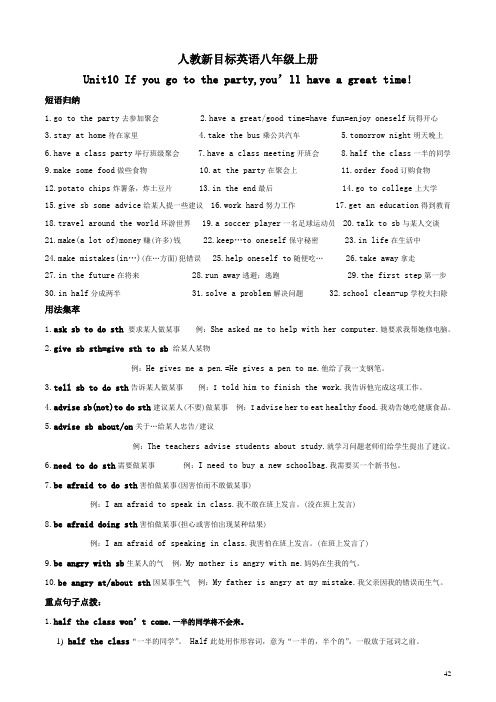
人教新目标英语八年级上册Unit10 If you go to the party,you’ll have a great time!短语归纳1.go to the party去参加聚会2.have a great/good time=have fun=enjoy oneself玩得开心3.stay at home待在家里4.take the bus乘公共汽车5.tomorrow night明天晚上6.have a class party举行班级聚会7.have a class meeting开班会8.half the class一半的同学9.make some food做些食物10.at the party在聚会上 11.order food订购食物12.potato chips炸薯条,炸土豆片13.in the end最后 14.go to college上大学15.give sb some advice给某人提一些建议16.work hard努力工作 17.get an education得到教育18.travel around the world环游世界19.a soccer player一名足球运动员20.talk to sb与某人交谈21.make(a lot of)money赚(许多)钱22.keep…to oneself保守秘密23.in life在生活中24.make mistakes(in…)(在…方面)犯错误25.help oneself to随便吃…26.take away拿走27.in the future在将来28.run away逃避;逃跑29.the first step第一步30.in half分成两半31.solve a problem解决问题32.school clean-up学校大扫除用法集萃1.ask sb to do sth要求某人做某事例:She asked me to help with her computer.她要求我帮她修电脑。
七年级下英语第十一讲Unit10知识点讲解

七年级下英语第十一讲Unit10知识点讲解Unit 10 I’d like some noodles.【Grammar】一、可数名词与不可数名词复习1、不可数名词不可数名词没有复数形式,分为物质名词和抽象名词物质名词:表示无法分为个体的物质,如meat,rice,water,milk,orange,beef,soup,mutton,tea,coffee 等抽象名词:表示动作、状态、情况、品质等抽象概念,如work,homework,time,health,friendship 等不可数名词的数量表示:有许多与食物、饮料有关的名词是不可数名词,他们可以和量词连用,量词有复数形式three glasses of milk some cups of tea a piece of bread two bowls of rice five bottles of juice2、可数名词可数名词有复数形式,其变化形式如下:(1)一般情况下在词尾加s. shop --- shops bag --- bags window --- windows(2)以s, x, sh, ch 结尾的单词在词尾加es。
class --- classes box --- boxes watch --- watches brush --- brushes(3)以“辅音字母+y”结尾的词,变y 为i 加es.(注意不是元音字母+y)story --- stories(4)以“o”结尾的名词,复数一般在词尾加“s”, 但有4 个加“es”。
tomato --- tomatoes potato --- potatoes photo --- photos口诀:黑人(Negro)英雄(hero),喜欢西红柿(tomato)和土豆(potato)。
(5)以f 或fe 结尾的词,多数变f 或fe 为ves. leaf --- leaves knife --- knives life --- lives (wife,wolf,thief,shelf,half)(6)不规则名词复数的变化man --- men woman --- women child --- children mouse --- mice tooth ---teeth foot --- feet goose---geese(7)名词单复数形式一样sheep --- sheep deer --- deer people --- people fish --- fish Japanese --- Japanese Chinese --- Chinese(8)关于哪国人的复数形式:中日友好是一致,英法联邦改a 为e,其余在后加s.Japanese --- Japanese Chinese --- ChineseEnglish man --- English men French man --- French menAmerican--- Americans Australian--- Australians Canadian--- Canadians Russian--- Russians Korean--- Koreans German---Germans (9)含有man woman 修饰的复合名词词组,变复数时两个都要变为复数。
人教版八年级上册英语Unit10单元整体教学设计精选全文

精选全文完整版(可编辑修改)人教版八年级上册英语Unit10单元整体教学设计If you go to the party, you’ll have a great time一、语篇分析What:本单元围绕“做决定”话题展开叙述,属于“人与自我”主题,包含身心健康,自我管理等子主题。
让学生了解不同条件会产生不同结果,培养健康生活态度。
在Section A 部分,Listening & Speaking以生日派对为话题,呈现了有关假设和推论的语言点,重点突出i f…will…句型。
通过对班级聚会的讨论,尝试做简单的语言输出。
在2a-2d部分呈现谈话主题几活动举办时间,同时涉及到活动内容和组织形式,并在2d部分呈现对话范例,补充情态动词should的使用,从而练习用英文给他人提出建议。
听说课部分的语言点,包括if引导的条件状语从句(主句用将来时和情态动词),在语法课部分进行充分总结和操练。
Section B部分进一步拓展了内容,听说环节围绕学生生活中的问题,谈论对事情的结果预测,包含了选择未来职业,以及思考生活中重要事情等话题,巩固if条件状语从句。
在阅读板块,设置了读前,读中,读后活动,谈论学生遇到的问题以及可以寻求帮助的方式。
最后通过写作部分达成综合输出,写作部分仍然采取一贯思路,先搭建脚手架,让学生填空,整理信息,并根据给出的框架开展书写练习。
Why:本单元选择“做决定”为主题,包含“预测”的认知能力相关思维素养。
八年级学生在生活和学习中会遇到很多做决定的情况,本单元设计能帮助学生对问题进行分析,并采取行动;另外,当学生在遇到困惑时,往往没有更加有效的解决办法,单元选取的语篇,帮助学生了解遇到问题可以从他人那里获得建议,同时也引导学生积极给他人提供建议,建立良好的生活态度。
How:本单元在Section A 的L&S当中,首先通过图片对话导入,让学生匹配不同的假设,从而体会if引导的条件状语从句的使用;然后在听说教学中,通过对话形式引导学生关注听力细节,提升听力策略应用,并在之后提供对话范例,便于学生开展语言输出训练。
初中英语八年级上册Unit10课本知识点(人教版)
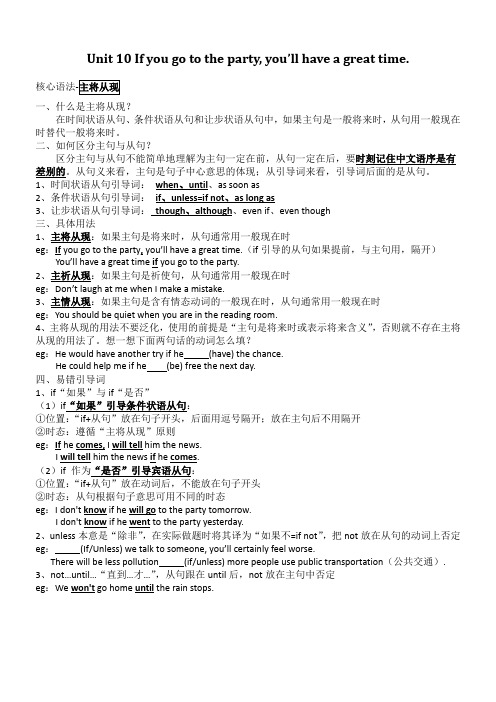
Unit 10 If you go to the party, you’ll have a great time.核心语法一、什么是主将从现?在时间状语从句、条件状语从句和让步状语从句中,如果主句是一般将来时,从句用一般现在时替代一般将来时。
二、如何区分主句与从句?区分主句与从句不能简单地理解为主句一定在前,从句一定在后,要时刻记住中文语序是有差别的。
从句义来看,主句是句子中心意思的体现;从引导词来看,引导词后面的是从句。
1、时间状语从句引导词:when、until、as soon as2、条件状语从句引导词:if、unless=if not、as long as3、让步状语从句引导词:though、although、even if、even though三、具体用法1、主将从现:如果主句是将来时,从句通常用一般现在时eg:If you go to the party, you’ll have a great time.(if引导的从句如果提前,与主句用,隔开)You’ll have a great time if you go to the party.2、主祈从现:如果主句是祈使句,从句通常用一般现在时eg:Don’t laugh at me when I make a mistake.3、主情从现:如果主句是含有情态动词的一般现在时,从句通常用一般现在时eg:You should be quiet when you are in the reading room.4、主将从现的用法不要泛化,使用的前提是“主句是将来时或表示将来含义”,否则就不存在主将从现的用法了。
想一想下面两句话的动词怎么填?eg:He would have another try if he (have) the chance.He could help me if he (be) free the next day.四、易错引导词1、if“如果”与if“是否”(1)if“如果”引导条件状语从句:①位置:“if+从句”放在句子开头,后面用逗号隔开;放在主句后不用隔开②时态:遵循“主将从现”原则eg:If he comes, I will tell him the news.I will tell him the news if he comes.(2)if 作为“是否”引导宾语从句:①位置:“if+从句”放在动词后,不能放在句子开头②时态:从句根据句子意思可用不同的时态eg:I don't know if he will go to the party tomorrow.I don't know if he went to the party yesterday.2、unless本意是“除非”,在实际做题时将其译为“如果不=if not”,把not放在从句的动词上否定eg:(If/Unless) we talk to someone, you’ll certainly feel worse.There will be less pollution(if/unless) more people use public transportation(公共交通). 3、not…until…“直到…才…”,从句跟在until后,not放在主句中否定eg:We won't go home until the rain stops.1、meet“遇见”:(考点1)变名词meeting“会议”,a class meeting“班会”、have a meeting“开会”2、video“录像”:(考点1)变复数videos,不要加es,watch a video“看录像”3、upset“失望;难过”(考点1)be upset about sth“对某事失望;心烦”,be upset with sb“对某人失望;不满意”,如Mary was not upset about the gift you gave her, but she was upset with you.(考点2)在写作时用upset替代sad、unhappy、unpleasant等词4、advice“建议”(考点1)advice不可数名词,a piece of advice“一条建议”、give sb some advice about sth“给某人关于某事的一些建议”、get advice from sb“从某人处得到建议”(考点2)变动词advise,advise doing sth,如Police advise staying at home.advise sb to do sth,如Police advise people to stay at home.advise that sb (should) do,如Police advise that people (should) stay at home.5、normal“正常的”:(考点1)变副词normally6、certain“确定的”:(考点1)变副词certainly7、angry“生气的”(考点1)be angry at/about sth,如The visitors were angry about the bad service.be angry with sb,如I was very angry with myself for making such a careless mistake.(考点2)比较级、最高级:angrier、angriest,也可用more angry、most angry(考点3)变副词angrily8、understand“理解”:(考点1)过去式understood(考点2)变形容词understanding“善解人意的”9、mistake“错误”:(考点1)make a mistake、make mistakes“犯错误”10、solve“解决”:(考点1)solve the problem“解决问题”、answer the question“回答问题”11、step“步骤”:(1)Step One=the first step“第一步”(2)step by step“一步一步地”12、experience:(考点1)“经验”不可数名词、“经历”可数名词13、half“一半”(考点1)in half“分成两半”、half an hour“半小时”、one and a half hours=an hour and a half“一个半小时”(考点2)be/go halfway to doing sth“部分地达到”,to是介词后接doing14、else“其他的”(考点1)放在复合不定代词、what之后,如Ask somebody else to help you.15、重点句型too…to…“太…而不能…”,如They will be too lazy to cook.16、重点句型It takes sb时间/钱to do sth“花费某人…做某事”,如It will take me too long to walk to the party.17、非谓语动词(1)to do作,如The first step is to find some you trust to talk to.(2)特殊疑问词+to do作,如The students are talking about when to have a party.(3)作,动词用,如(take)to someone (help) a lot.18、keep短语:keep…to oneself“保密”、keep doing sth“反复做某事”、keep on doing sth“持续做某事”、keep+形容词“(系动词)保持…”19、care(考点1)变形容词careful、careless、变副词carefully、carelessly(考点2)短语:take care of=look after“照顾”、Take care!=Be careful!“当心!”、care about“关心”20、短语过得愉快have a great time举办一场聚会have a party在…有问题have problems with sth 赚钱make money上大学go to collage乘公交车去某地take the bus to sp 要求某人做某事ask sb to do sth 环球旅行travel around the world 从某地逃跑run away from sp与某人打架get into a fight with sb 接受教育get an education向某人说抱歉say sorry to sb不敢做某事be afraid to do sth最后in the end=at last。
2021春冀教版九年级英语下册 Unit10 Unit 10 语法专题

Unit 10Get Ready for the Future 语法点集中攻坚语法点集中攻坚“主将从现”原则——主从复合句中一般将来时与一般现在时的搭配考点ꢀ1主句为一般将来时,时间状语从句用一般现在时表示将来。
考向引导时间状语从句的连词有:when/ before/after/ as soon as/ once/ whenever/ until等。
eg:The doctors won’t leave until the patients get out of danger.医生们将不会离开,直到病人脱离危险。
The reporters will have an interview when themeeting is over.散会后,记者将进行采访。
典例CI’ll go to visit my aunt in England ______ thesummer holiday starts.[岳阳]A. sinceꢀꢀB. untilꢀꢀC. as soon as【点拨】句意:暑假一开始我就去英国拜访我阿姨。
since 自从……以来;until 直到……为止;as soon as 一……就……。
根据句意可知答案。
考点ꢀ2主句为一般将来时,条件状语从句用一般现在时表示将来。
考向一引导条件状语从句的连词有:if/unless/aslong as 等。
eg:The sports meeting will be put off if it rains.如果下雨,运动会将被推迟。
I’ll come to the party unless I am not invited.我会来参加聚会除非我没有收到邀请。
考向二祈使句+and/ or +将来时的句子。
其中祈使句表示条件,and/ or 后面的句子表示结果。
eg:Think it over before your action, or you’ll regret.行动前要三思,否则你会后悔。
人教版初二上册英语第十单元unit 10语法篇
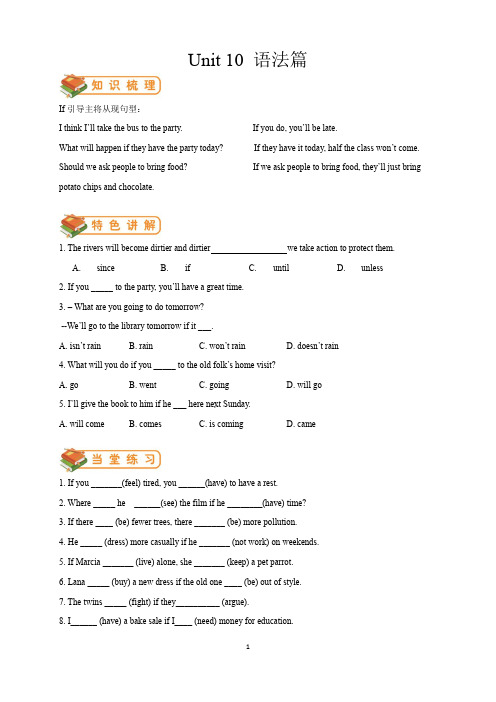
Unit 10 语法篇If引导主将从现句型:I think I’ll take the bus to the party. If you do, you’ll be late.What will happen if they have the party today? If they have it today, half the class won’t come. Should we ask people to bring food? If we ask people to bring food, they’ll just bring potato chips and chocolate.1. The rivers will become dirtier and dirtier we take action to protect them.A. sinceB. ifC. untilD. unless2. If you _____ to the party, you’ll have a great time.3. – What are you going to do tomorrow?--We’ll go to the library tomorrow if it ___.A. isn’t rainB. rainC. won’t rainD. doesn’t rain4. What will you do if you _____ to the old folk’s home visit?A. goB. wentC. goingD. will go5. I’ll give the book to him if he ___ here next Sunday.A. will comeB. comesC. is comingD. came1. If you _______(feel) tired, you ______(have) to have a rest.2. Where _____ he ______(see) the film if he ________(have) time?3. If there ____ (be) fewer trees, there _______ (be) more pollution.4. He _____ (dress) more casually if he _______ (not work) on weekends.5. If Marcia _______ (live) alone, she _______ (keep) a pet parrot.6. Lana _____ (buy) a new dress if the old one ____ (be) out of style.7. The twins _____ (fight) if they__________ (argue).8. I______ (have) a bake sale if I____ (need) money for education.9. Peter ____ (send) me a beautiful souvenir if he ____(tour) Spain.10.If Mr. green _______ (say) I am hard- working, my parents _____ (feel) glad.11. I______ (go) to the beach if it________ (not rain) this week.12. ____they ______ (have) a match if the P.E. teacher _______ (be) busy?13. He _______ (write) a letter to his grandparents if he ______ (get) his report card this week.14. If she ______ (get) up late, she _____ (not catch) the early bus.15. Peter _________ (major) in English if he _______(pass) the exams in peking university.一、单项选择1. If he harder, he will catch up with us soon.A. studyB. studiesC. will studyD. studying2. Mike a film if he's free next week.A. seeB. sawC. has seenD. will see3. We should each other.A. helpB. to helpC. helpingD. helped4. --- Who did you go to the movies ?--- Nobody. I went alone.A. withB. aboutC. forD. from二、适当形式填空(单句适当形式)5. If she (run) every day, she will be much stronger.6. If you (be) late for school, your teacher will be angry.7. I (fly) to Beijing if it (not snow) tomorrow.三、完形填空I used to hunt(打猎) and have killed a few deer. There was great excitement in16 and shooting(射击).One cold morning in winter, I went alone to a hillside. I carried my gun, a bottle of17 and three thick sandwiches.I found a natural hiding place, cleared the snow and sat down. It was pretty cold, but I had warm clothes on. I sat there waiting for about an hour. 18 showed. I ate two sandwiches and drank a little coffee. The place was really quiet.Suddenly, a big beautiful buck(雄鹿) appeared less than twenty feet away from me. There was no19 near to him. Surely I couldn't miss. I waited for him to run with a start.To my surprise, he came toward me! He was curious(好奇的), I guess, or maybe he was stupid. For this was no youngster, but a fully grown-up one. He must have known about men and their guns. But this buck came 20 , and I still waited. His big eyes never moved from my face. His wonderful head with a set of antlers was clear in the sight.I was getting a bit 21 now. A buck can do a lot of harm to me. Well, he walked right up to where I was sitting. Then he stopped and looked at me!What happened next is hard to 22 . But it all seemed quite natural. I reached up and scratched(挠) his head. And he enjoyed it! That big, wild, beautiful buck lowered his head and asked for23 !I scratched his head again and his body. His nose touched my shoulder. I 24 him my last sandwich.Well, he finally went his way, down the hill. I just watched him go—a strong buck carrying a proud head.I picked up my bottle and gun, and started walking back. I 25 hunting from that day on.16. A. standing B. waiting C. drinking D. driving17. A. water B. tea C. milk D. coffee18. A. Something B. Anything C. Everything D. Nothing19. A. cover B. leaf C. snow D. stone20. A. away B. back C. closer D. farther21. A. excited B. nervous C. happy D. surprised22. A. believe B. decide C. guess D. solve23. A. food B. play C. more D. less24. A. prepared B. fed C. carried D. showed25. A. looked up B. picked up C. lifted up D. gave up三、完形填空(共10小题;共15.0分)Wang Ling, a middle school girl, felt angry with her parents after getting a boy's phone call. “A classmate called me to discuss homework. We talked 8 just a few minutes before my parents got mad,” said the girl. “They asked whether I l iked the boy. I said I didn't,9 they wouldn't believe me.”Wang's trouble is not strange at all because puppy love (早恋) becomes a big headache for10 parents and schools. They worry that puppy love will be bad for 11 . Her school makes it a rule not to allow any talk or any physical contact (身体接触) 12 one boy and one girl alone.Many students say they understand 13 parents and teachers are so nervous about puppy love. But some think they are going too far. “We have our own thoughts and we know what to14 with it,” said Wang Ling.Another girl, Jiang Ting, liked making friends with boys. “Boys and girls can learn from each other,” she said. “My mother as ks me to study hard. However, she 15 stops me from making friends with boys.” Once Jiang told her mother she might fall in love with a boy. Her mother let Jiang make16 own decision. Soon Jiang found that she didn't like him any more because the boy was not as17 as what she had thought before. And she did worse and worse in her subjects because she spent much on it. At last she understood the worry from schools and most parents about puppy love.8. A. for B. in C. with D. to9. A. because B. if C. but D. and10. A. both B. none C. either D. neither11. A. game B. study C. match D. housework12. A. during B. between C. around D. about13. A. how B. what C. who D. why14. A. play B. live C. do D. fill15. A. never B. already C. ever D. just16. A. its B. my C. his D. her17. A. good B. bad C. heavy D. thin四、阅读理解(共10小题;共20.0分)A18. After reading the form, we know this is .A. a study plan of Jack BrownB. a teaching prediction of Lisa SmithC. a school report about Jack BrownD. a working plan of Andrew Robinson19. Which of the following is not mentioned in the form?A. Art.B. Music.C. Chemistry.D. History.20. From the form, we know that Jack's best subject is .A. scienceB. SpanishC. geographyD. English21. From this form, we know Jack is not so good at .A. science and geographyB. chemistry and historyC. history and SpanishD. music and English22. According to the form, which of the following is TRUE?A. Jack likes pop music very much.B. Jack doesn't do well in science.C. Jack can do better if he works harder next term.D. Jack learns six subjects in school.BEating out is more popular in Britain today than it has ever been. It is reported that British people spend more eating out than cooking for themselves and eating at home. It seems that many British people are becoming more and more interested in how good their food tastes, and also how healthy it is.However, eating out can also be expensive, so British people do not eat out every night. When having a date with friends, or having a birthday, many people like to go to a restaurant, and people often also eat in a restaurant before going to the cinema or the theater.As in all cultures, there are many rules of manners about eating. The knife and fork should be used in the correct way. It is also impolite to speak with your mouth full then you are eating.Most British cities have a large collection of food as well as British food, from the very cheap to the very expensive—French, Italian, Indian, Chinese, Thai, Japanese and many, many more.When people are too tired to cook after work, they often get a "takeaway". This means that they order from a take-out restaurant by telephone, and then go to get it. Many take-out restaurants also send it to your house. All you have to do is to open the door, pay and eat!23. When do British people often eat in a restaurant?A. After having a birthday.B. Before watching a movie.C. When they feel tired.D. If they want to have natural food.24. Many people prefer to eat out nowdays because .A. eating out is cheaper than cooking at homeB. they can learn more manners in the restaurantC. people care more about their food than beforeD. people don't like to stay at home after work25. From the fourth paragraph, we can learn that .A. British dishes are very expensiveB. Japanese dishes are most expensiveC. British people like foreign foodD. French food is most popular26. The "takeaway" is the food .A. you order and take out of the restaurantB. that is left when you are eating in a restaurantC. you order but don't need to pay at onceD. that is sold and ordered only on the phone27. What is the best title(标题) of the passage?A. British Restaurant CultureB. British Table MannersC. Best Restaurants in BritainD. Best Food in Britain。
八年级上册第十单元的知识点

八年级上册第十单元的知识点单元语法:If引导的条件状语从句,主句和从句动作都没有发生,那么①采用主将从现,也就是主句采用一般将来时,从句用一般现在时。
②从句采用一般现在时,主句含有情态动词may/might/can/could/must/should ③重庆采用一般现在时,主句为祈使句可以拓展为:主从复合句,主句和从句的动作都没有发生时,采用主将从现① If you go to the party,you'll have a great time.② If I am free,I can do a lot of things that I can do.③ When I go to the university,I will enjoy myself.短语1. have a class meeting举办一个班会 have a parents' meeting举办一个家长会 have a family meeting举办一个家庭会议anize(V)--organization(n)3.by taxi take a taxi坐出租车4.a piece of advice一条建议 three pieces of advice 三条建议 some advice一些建议,切记advice是不可数名词advice(n)--advise(V) advise sb. to do sth.建议某人做某事5.a travel agent一个旅行社 travel--travelling/traveling6.keep...to oneself 保守秘密7.normal(adj)--normally(adv)8.unless=if...not 除非,如果不9.in one's wallet在某人的钱包里 lose one's wallet丢了某人的钱包get sb. a new wallet给某人买个新钱包10.certain(adj)--certainly(adv)11.be angry with sb.生某人的气angry(adj)--angrily(adv)12.make a mistake 犯一个错误 make careless mistakes犯粗心的错误13.be careful of sth./sb.当心某事/某人 be careful to dosth.做某事小心14.solve(V)--solution(n) solve problems解决问题15.the first step第一步 two steps 两步16.trust=believe in 信任17.experience经验(不可数),经历(可数) have experience( in) doing sth.做某事有经验have an unusual exeprience有一次不寻常的经历18.in half分成两半 be halfway to doing sth.做某事做到一半19.else①修饰特殊疑问词 What else?还有别的吗?②修饰不定代词,放于不定代词之后 anything else 别的任何事儿20.have a good time=have fu=enjoy oneself 玩的开心21.half the class22. half a cup半杯 half an hour半小时 half the students 一半的学生 half the class23.order food from...从……预订食物24.too+adj/adv+to+V原太……而不能……25.look the worst看起来最糟糕26.go to university/college去上大学 travel around the world=travel all over the world周游世界 make a lot of money赚大量的钱get an education受教育be famous for由于……而出名 be famous as 作为……而出名27.get advice from an expert得到一个专家的建议28.have problems/trouble/difficulty doing sth.做某事有困难have problems/trouble/difficulty with sth.某方面有困难29.be afraid to do sth.=be afraid of doing sth.害怕做某事 be afraid of sth.害怕某物30.remember to do sth.记得去做某事 remember doing sth.记得做过某事forget to do sth.忘记去做某事 forget doing sth.忘记做过某事31.It's best( not ) to do sth.最好(不)做某事32.run away from从……逃跑33.say sorry/goodbye/thanks/hello to sb.对某人说抱歉/再见/谢谢/你好34. fight with sb.和某人打架 get into a fight with sb.35.Some people believe the worst thing is (to do )nothing.一些人认为最糟糕的事就是什么也不做36.He thinks the first step is( to find )someone (you trust)to talk to.他认为第一步是找某个你相信的人来讨论. 表语定语从句。
